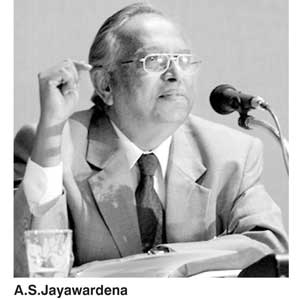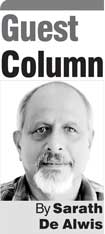Sunday Feb 22, 2026
Sunday Feb 22, 2026
Saturday, 6 August 2016 00:02 - - {{hitsCtrl.values.hits}}
 It was an evening when what was best and beautiful about two people was celebrated by adoring offspring, admiring peers and ardent disciples. It was also a feast and a harvest of memories of a public servant of great learning who had mastered the chemistry of letting go and holding on.
It was an evening when what was best and beautiful about two people was celebrated by adoring offspring, admiring peers and ardent disciples. It was also a feast and a harvest of memories of a public servant of great learning who had mastered the chemistry of letting go and holding on.
I am grateful to Migara, Menaka and Sonali for inviting me to celebrate the 80th birthday of their father A.S. Jayawardena and the 70th birthday of their mother Lalitha Jayawardene.
The evening had an appropriate first act. Cocooned in overpowering humility, A.S Jayawardena has never claimed credit for his leadership of the Central Bank in those trying times when he steered the country’s premier financial institution from brink of physical collapse to normalcy.
 The then Governor of the Central Bank had commissioned sitar maestro Padeep Rathnayake to compose a symphony to commemorate the rebuilding of the Central Bank following its massive destruction caused by a terrorist bomb attack in 1996.
The then Governor of the Central Bank had commissioned sitar maestro Padeep Rathnayake to compose a symphony to commemorate the rebuilding of the Central Bank following its massive destruction caused by a terrorist bomb attack in 1996.
Twenty years later, in a stirring acknowledgement of his early patron, maestro Pradeep with a collaborator on tabla treated the gathering to a mesmeric rendition of the same symphony which he called ‘memories of indrakeelaya’ – the unshakable spirit of Indra, the lord of the ‘Devas’. The rhythmic journey took the listeners through fourphases encountered by those who dare to live their dreams – peace, conflict, lamentation and hope.
Thoughtful friends had compiled a miscellany of messages, essays and stories in tribute to the octogenarian former Governor of the Central Bank. The collective endeavour by a galaxy of penetrative minds found ‘many facets’ of A.S. Jaywardena – sagacious economist, visionary leader, connoisseur of the arts, dependable friend, esteemed colleague, and caring boss.
The privilege of presenting the slim volume ‘Many Faceted ASJ’ was accorded to fellow economist and lifelong friend Dr. Usvattearchchi, who begins his narrative with a line that informs us of a wistful past. “AS and I sat for the University Entrance Examination in December 1953, he from Royal College and I from Kuliyapitiya Central.” His delightfully uncontrived reminiscences are made sans his usual Hegelian dialectic but with composed detachment. “AS and I have lived long. We have individually and together with our families enjoyed that life very much.”
Chandi Chanmugam in his remarks describes A.S. Jayawardene as a Banker’s Banker, willing to learn by listening. His essay makes an anecdotal reference to how A.S. Jayawardena made the transition from Secretary Ministry of Finance to Governor of the Central Bank.
“Not much later, the relationship between AS and a powerful Minister who was a close confidante of the President became strained. The President sorted out an impending impasse by appointing AS to the post of Governor of the Central Bank, having first created the vacancy by appointing the then incumbent as the country’s representative to International Monetary Fund.”
He concludes ‘Right through his service as an economist, he had one great ambition: one day to be the governor of the Central Bank of Sri Lanka. And when given the opportunity, he took it with pleasure.”
Anoop Singh of the IMF and acknowledged macroeconomic surveillance specialist writes, “I will not go in to all his achievements that you can easily read about” and arrives at a resolute conclusion.
“His challenges were overwhelming. Among them, to protect the economy, and the country’s heritage, as much as possible from the domestic and regional conflicts that grew in the 1980s and 1990s. He did this in a number of critical positions in the government, including as Secretary to the Treasury, and then as Governor of the Central Bank from 1995 to 2004.”
Another contemporary sharing the same discipline Nimal Sanderatne finds the phenomenal in his illustrious colleague. “A.S. Jayawardena’s outstanding career is a testimony to his academic brilliance, steadfast commitment to duty and unwavering integrity. His exceptional career in the Central Bank, the Public Service and in banking has no parallel. He has held all important positions in the financial world and the highest positions in the public service.”
Former Deputy Governor turned outspoken civil society activist W. A. Wijewardene is eloquent on the disarmingly open-minded approach of Governor A.S. Jayawardena in framing and implementing policy. “What AS demonstrated was, that the Central Bank’s communication policy was important in establishing its reputation among the stakeholders. The bank should not have any fear of coming before the media and explaining its position to the public.” He then identifies the three imperatives that the Governor recognised – ‘clarity, transparency and predictability’ of central bank actions.
Rose Cooray combines appreciation, awe and admiration. She discovers the peasant from Matale who had kiribath and fish curry for breakfast every day and the urbane banker who carefully selected the wine to go with the food while in Washington.
I have known A.S. Jayawardena all my life. His home in Kaikawela, Matale was near my father’s ancestral home. He was a role model for mothers in the neighbourhood. He epitomised every mothers dream. ‘Anna balapan igena gaththa lamai’ was the inevitable refrain I earned from my mother who thought that Notary Jayawardena and Head Mistress Madam Jayawardena of the mixed school Kaikawela were fortune’s favourites with Amaranada Somasiri their firstborn.
A.S. Jayawardena was my teacher and friend. I do not know Rose Cooray. Yet, in Rose Cooray I find a kindred spirit. She writes, “During my stay with the Jayawardenas, my impression of him as a tough boss did not change much, but I certainly realised the depth of knowledge he had and the kindness of his heart.”
‘Abunodisceomnes’ from one example, learn all – Virgil.